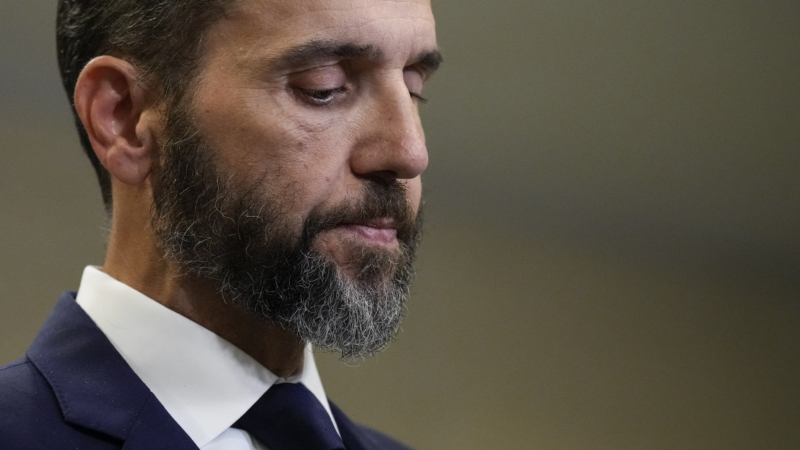Supreme Court appears skeptical of challenge to ban on gender-affirming care for minors
The U.S. Supreme Court’s conservative majority appeared skeptical Wednesday of a challenge to a Tennessee law that bans gender-affirming care for transgender children.
Chief Justice John Roberts suggested that the issues should be left to state legislatures rather than the courts.
“The Constitution leaves that question to the people’s representatives, rather than to nine people, none of whom is a doctor,” he said.
Solicitor General Elizabeth Prelogar put the government’s case this way: “States have leeway to regulate gender-affirming care. But here, Tennessee made no attempt to tailor its law to its stated health concerns.”
But she faced intense questioning from the court’s conservatives. Notably, Justice Neil Gorsuch, who wrote a majority opinion in a historic case that granted employment protections to gay and transgender workers, remained silent through the hours-long arguments.
Roberts cited what he described as scientific uncertainty about the longer-term implications gender-affirming medical treatments for minors and asked why the courts should get involved. That view was echoed by Justice Samuel Alito, who cited Swedish data, and said it was “directly contrary to the sweeping statement in your petition” that “these treatments have benefits that greatly outweigh the risks and the dangers.”
Prelogar said she acknowledged that there was a debate on the issue both in the United States and elsewhere, but she said she “stand[s] by that there is a consensus that these treatments can be medically necessary for some adolescents — and that’s true no matter what source you look at.”
Tennessee is one of more than two dozen that, in the past three years, has enacted laws that ban puberty blockers, hormones and other treatments for minors seeking gender-affirming care. The issue has become highly politicized, as anyone who watched election ads this fall can attest.
The law bars access to treatment for kids who want to transition from their sex assigned at birth, but permits those same medications to be used when treating minors suffering from other conditions, like endometriosis or early-onset puberty.
Challenging Tennessee’s law in the Supreme Court were three trans kids and their parents. They argue that the ban violates the Constitution’s guarantee to equal protection of the law.
ACLU lawyer Chase Strangio, the first openly trans lawyer to argue in front of the Supreme Court, represented the kids and their parents. He argued that “these are very commonly used medications,” and Tennessee “bans them for one and only one purpose.”
“The government of Tennessee is displacing the decision-making of loving parents,” who follow the “recommendations of doctors,” Strangio told NPR. “At the end of the day, the law is tailored to one and only one interest, which is to enforce Tennessee’s preference that adolescents conform to their birth sex.”
Tennessee State Sen. Jack Johnson, who introduced the challenged bill, says the law is just another example of the state exercising its regulatory power.
“You can’t get a tattoo in Tennessee unless you’re 18. You can’t smoke. You can’t drink,” he observed to NPR. Tennessee regulates “a number of different types of medical procedures,” Johnson said, adding that “it felt like this was the best public policy to prevent kids form suffering from irreversible consequences, things that cannot be undone.”
A decision in the case is expected this summer.
A record 24 million people now get Obamacare health plans. Will it last under Trump?
Enrollment in Affordable Care Act health insurance plans has grown every year of the Biden administration, leading to a record high rate of people with insurance.
Tilda Swinton thinks about death and says you should, too
Swinton plays a woman dying of cancer in Pedro Almodóvar's The Room Next Door. "A life spent considering how we're going to spend our end is not wasted time," Swinton says.
Girl Scouts are retiring two cookie flavors (don’t worry, your Thin Mints are safe)
2025 will be the last time you can buy Girl Scout S'mores and Toast-Yay! cookies. They join the ranks of many other discontinued flavors — RIP Mango Cremes with Nutrifusion and cheesy Golden Yangles.
Here’s where things stand for several major landmarks in the Los Angeles fires
The fires raging across Los Angeles are putting some cultural institutions in danger.
Justice Department wants to release only part of its report on Trump cases
Prosecutors dropped the two criminal cases against Trump after he won the 2024 election, and the final report by Smith may be the last chance for prosecutors to explain their decisions.
Trump asks the Supreme Court to block his sentencing in hush money case
President-elect Donald Trump is scheduled to be sentenced on Jan. 10 in New York. His latest legal move to block sentencing comes after a New York appeals court rejected a similar appeal Tuesday.




